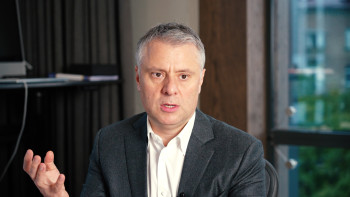Ukrainian energy company on Russia’s attacks on infrastructure: ‘No system in the world has faced the same’

Ukraine faces its most challenging winter as Russia relentlessly strikes its energy system to plunge the nation into cold and darkness.
Since mid-October, Russia's carried out five mass missile attacks that have damaged 40% of Ukraine's energy system and made long power outages a new reality for many Ukrainians.
And every missile strike is yet another uphill battle for DTEK, the country's largest energy company, dominating Ukraine's coal production and electricity market.
DTEK generates 30% of Ukraine's electricity and is owned by Ukraine's richest man, Rinat Akhmetov.
The company supplies power to roughly 5.5 million households and 150,000 companies, including 3.5 million customers in Kyiv, Donetsk and Dnipropetrovsk oblasts, through its branch Yasno (DTEK Solutions), led by Serhii Kovalenko.
"Every scenario is possible," Kovalenko told the Kyiv Independent, not dismissing potentially prolonged mass blackouts across Ukraine in case of renewed Russian attacks. "No matter how you prepare, it is still very difficult to predict what's going to happen."
Despite that, Oleksandr Fomenko, the head of DTEK Grids, the branch in charge of taking care of the company's electricity network, dismissed the worst-case scenario of days or weeks of total blackout nonetheless.
He argued that the country's grid was large and solid enough to withstand the winter ahead.
The Kyiv Independent talked to Kovalenko and Fomenko about the work to repair the damaged infrastructure and what Ukraine should expect entering its coldest, darkest months.
Difficult winter
As of Nov. 30, one week after the latest attack, Ukraine was facing a 27% electricity shortage, according to Ukraine's state grid operator Ukrenergo.
The country's electric system was on the brink of collapse following the recent attacks.
Renewed emergency power cutoffs were introduced in Kyiv on Nov. 29, DTEK said, noting that the official power outages schedule, in effect since October, was scrapped.
Some residential areas can face four to twelve hours of power cutoffs per day, according to Yasno’s online schedule, but shutdowns can last longer when emergency cutoffs are introduced.
Many Kyiv apartments were left without electricity for nearly two days following the Nov. 23 Russian attack. Often accompanied by water outages and lengthy mobile service interruptions, the cuts put a severe burden on the population.
Fomenko said that DTEK engineers, alongside Ukrenergo specialists and other emergency services, are "doing everything possible" to stabilize the situation.
Ukrenergo allows a particular amount of electricity per day depending on the grid's state the day before, and DTEK distributes it within these limits the next day.
The shares of electricity restrictions are divided between critical infrastructure and households. The lion's share of electricity goes to critical infrastructures such as hospitals, maternity homes, or heat and water supply systems.
The rest is evenly distributed among DTEK consumers.
If the amount of electricity is significant enough, then so-called schedules of power cuts begin to work so that people can plan their day or week, Kovalenko said.
If the grid is under too much strain, the company tries to distribute it evenly among consumers over the course of one day.
"These are the emergency shutdowns," Kovalenko said. "If you look at these schedules, you can see that they were done so a person would always have power every day in the evening."
Some apartment blocks don't face such shutdowns, but that's because they're built on a priority line, on the transmission way to critical infrastructure such as a hospital. Operators prioritize lines accordingly.
"It's about scarcity and power lines," he said. "If the house is on the same line as the hospital, we will not shut down the hospital to switch off that house."
Fomenko says Ukraine may import some electricity from Europe at one point, but "only for a short-term period and in a limited amount" as it wouldn't be enough to cover the country's needs.
"This (entire) winter is probably going to be very difficult, and there will be restrictions on electricity consumption in Ukraine," Fomenko said.
The power cuts could last until March, Kovalenko said on Nov. 21.
“And although now there are fewer power outages, I want everyone to understand that most likely Ukrainians will have to live with power cuts at least until the end of March,” he wrote on Facebook two days before the latest, and biggest yet, Russian attack on Ukraine’s energy infrastructure.
Kovalenko called upon consumers to be careful and not turn on every appliance at once when they get electricity back.
“Don't switch on every appliance at home at once when the light is on," he said. "Turn the lights on first, then the kettle, then the washing machine after 20-30 minutes."
He said that the fuses burn out in large apartment buildings, which adds more work to grid workers.

Fixing the grid
Fourteen thousand employees have been working on the DTEK network across Ukraine to ensure electricity transmission despite the risks, Fomenko told the Kyiv Independent.
The employees are working around the clock to restore electricity distribution in extremely hard conditions, he said.
"They are the real heroes," Fomenko said.
Russia has been targeting Ukraine's critical infrastructure since early October, openly admitting it was part of its strategy.
According to the Geneva Conventions, attacking vital public infrastructure is a war crime.
"Carrying out these attacks with the sole purpose of terrorizing civilians is a war crime," Marie Struthers, Amnesty International's Director for Eastern Europe and Central Asia, said on Oct. 21.
In Ukraine, the power grid has become a strategic object, making it a sensitive matter under classified information.
U.S. State Secretary Antony Blinken announced new assistance to restore Ukraine's power transmission ability, Reuters reported.
Reuters also reported that U.S. and NATO allies would allocate money and equipment to Ukraine to help it restore power.
While authorities said up to 40% of the energy system had been destroyed as of early November, DTEK couldn't disclose what had been damaged nor the protocol the company implemented to fix the grid after the attacks.
The amount of damage and their costs can't be assessed at the moment, Fomenko said.
The process is still ongoing to restore power grids throughout the country, in most of its regions, including in Kherson Oblast, a part of which recently has been liberated from the Russian occupation.
According to DTEK, the most affected regions are those where the front line ran – Kyiv, Chernihiv, Sumy, Kharkiv, Donetsk, Dnipropetrovsk, Zaporizhzhia, Mykolaiv, and Kherson oblasts.
Damages come in all shapes and all forms depending on what was hit, DTEK’s spokeswoman Antonina Antosha said, which adds up to the difficulty in assessing a final number.
"Some will take hours to get repaired, others will take days, and there are also some which will take years to get repaired," she said. "It's really hard to get a total number."
DTEK expects you to pay the bill
Consumers may find it hard to pay for electricity in wartime and over shutdowns, but the company says it needs the money to keep the repair work going.
There are solutions, Kovalenko said. The state gives subsidies to consumers to pay for their utility bills, including electricity.
As of November, 90% of Yasno’s subscribers pay their bills, according to Kovalenko. Kyiv consumers still owe a bit over $8 million in debt in total to Yasno for October.
"This is a large amount, but it is not critical," he said. The total amount consumers from the oblasts of Kyiv and Dnipropetrovsk owe to Yasno is a staggering $21.6 million for October alone.
"That's why the only thing we can do as consumers, apart from saving electricity, is to pay for already consumed electricity," he said.
________________________________________________________________________
Note from the author:
Hello, it's Alexander Query, the reporter who wrote this piece. As you just read, Ukraine's energy system is under strain, which makes simple tasks like working on stories a daunting challenge during shutdowns. Still, we're proud to say this won't stop us from delivering the kind of journalism our readers want about Ukraine. Please consider supporting our work by becoming a patron of The Kyiv Independent.











